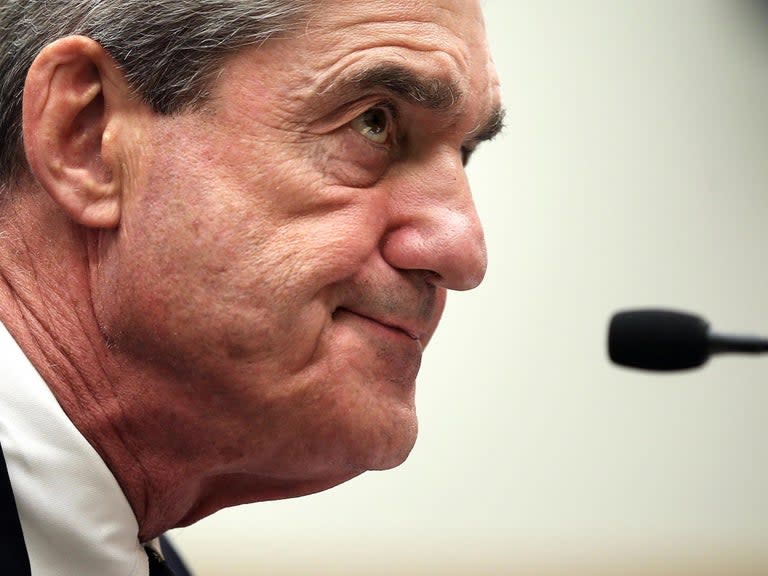Mueller isn't about to become a Democrat ally — the sooner we accept that, the better
Former Special Counsel Robert Mueller III’s appearance before the House Judiciary Committee this week is the beginning of the end — for better or worse.
Mueller’s investigation encompassed nearly two years of branching investigations into Russia’s alleged interference in the 2016 election and Donald Trump’s alleged, potentially criminal, attempts to derail the special prosecutor’s work. Through it all, Mueller has maintained trademark silence — to heavy criticism from both Democrats and Republicans.
With his silence set to end, Democrats and Republicans must reckon with the closing of a monumental chapter in American history. Whether Mueller’s testimony spurs Democrats to pursue impeachment hearings or leaves the issue of presidential obstruction to wither away, the next act of this unprecedented American drama will play out without Robert Mueller on stage.
Mueller has provided testimony to Congress on at least 88 prior occasions, first as Acting United States Deputy Attorney General under President George W Bush, then as FBI Director under Presidents Bush and Obama. But the heated questioning Mueller faced during his 2004 testimony on intelligence failures surrounding the September 11th attacks won’t come close to the firestorm awaiting him this Wednesday.
Republicans are eager to attack Mueller’s credibility by framing his investigative team as angry, partisan Democrats. At the same time, Republican leadership knows that when asked, Americans say they are twice as likely to trust Robert Mueller as they are Donald Trump.
Republicans are walking a dangerous line. Mueller is known for maintaining his composure during contentious hearings, and attempts to browbeat a respected law enforcement official with talking points straight out of President Trump’s Twitter account may cause more harm than Republicans expect. Even as Republican leaders counsel caution, however, Trump allies like Jim Jordan are itching for a chance to try and humiliate Mueller in front of millions of American voters.
If the risks for Republicans are immediate, the dangers facing Democrats are broader and more consequential in scope. Democrats are hoping Mueller will walk them through key sections of his report, specifically 10 episodes of potential obstruction of justice allegedly engaged in by President Trump.
Democrats will also seek to drive a wedge between Mueller and his former boss, Attorney General William Barr, who many on the left justifiably accuse of whitewashing Mueller’s findings with a glowing executive summary gift-wrapped for Trump. Expect key Democrats to focus on where Mueller and Barr disagree, and to probe why Mueller wrote a critical public letter to the Attorney General expressing concern about Barr’s pro-Trump summary.
Mueller’s appearance may be catnip for the crowd of “Resistance” figures active on social media, but they’re likely to be disappointed. Both wish-casting Democrats and anti-Trump Republicans are letting their fantasies do the driving. That could be awful for Democrats come 2020.
Mueller isn’t going to use the House Judiciary Committee as his platform to declare open war on Barr and Trump. He isn’t waiting for a big, televised moment to share his real evidence he has. There will be no “surprise indictments.” This isn’t House of Cards.
As Helaine Olen said in the Washington Post, Robert Mueller will not save us. In providing a comprehensive report detailing 10 clear examples of potential obstruction, the Mueller investigation reached as far as it felt legally possible. What Democrats do with those 10 examples — and whether they can rouse Speaker Nancy Pelosi from her unwillingness to consider impeachment — is up to the party.
Anyone expecting Mueller to answer “yes” when asked if President Trump obstructed justice fails fundamentally to understand Mueller or his conception of how law enforcement investigations work. Numerous times over the past three months we’ve heard the same refrain: the president may have committed crimes, but the Department of Justice can’t criminally indict a sitting president.
By laying out in riveting, overflowing detail the potential crimes committed by President Trump, Mueller has taken the liberty of doing all the homework for impeachment. However his marathon appearance on Capitol Hill turns out, that homework will remain in the public record. Whether Democrats decide to investigate further isn’t a decision Mueller can make, and he’ll likely say as much when asked.
Instead of focusing on trying to turn Mueller into a Democratic ally, Democrats ought to turn to the evidence Mueller has already provided. We need more information about the specific incidents of potential obstruction that concerned Mueller enough to catalogue them at length. That duty falls to the investigative powers of Congress.
This week’s testimony likely marks Robert Mueller’s final act in public life, and the world will be watching. But what comes after Mueller’s remarks is even more important than Wednesday’s circus.
Democrats must decide, with or without a home run Mueller hearing, whether we act on the evidence so clearly presented to us.
Max Burns is a Democratic strategist and former Communications Director for Robert F. Kennedy Human Rights. Follow him at @themaxburns


